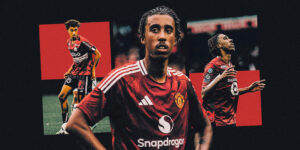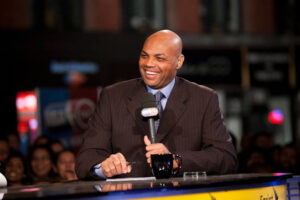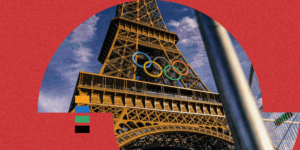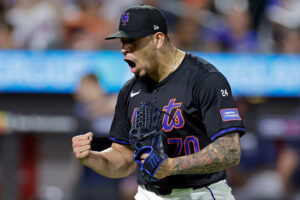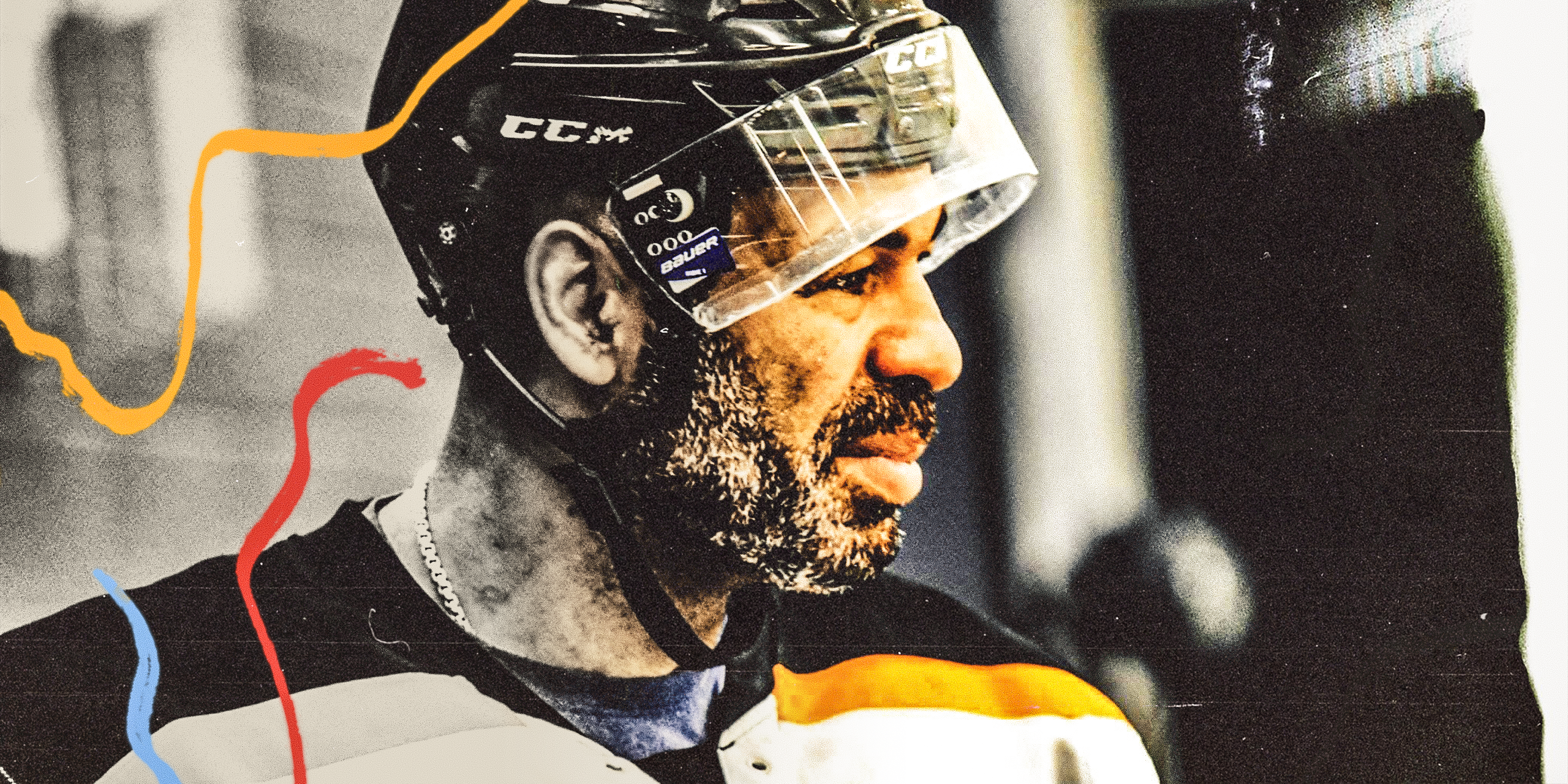
WENDAKE, Quebec — The line stretches across the lobby to the glass-door entrance 15 minutes before warmups for a hockey game in a low-level pro league just north of Quebec City. We pay $12 per ticket at a table next to the Wendake Sports Complex pro shop, where a game-worn Black Jack No. 87 jersey bears the name of the league’s most famous player: BRASHEAR.
He played in 1,025 NHL games and racked up 2,635 penalty minutes during his 17-year career. He earned more than $16 million as one of the league’s most feared enforcers for the Montreal Canadiens, Vancouver Canucks, Washington Capitals, Philadelphia Flyers and New York Rangers.
He is now almost 52 years old and we are here to see the famous fighter go one more round.
Donald Brashear is the marquee attraction. He is the Wendake Black Jack Captain. He appears in most of the team’s online promotions. Brashear is the only player not wearing a helmet during warmups. His bald head glistened under the rafter lights. From the stands, he looks almost exactly as he did when he retired from the NHL 13 years ago. A salt and pepper beard and slight lines around his eyes are all that betray his age. He’s 6-foot-3 but looks at least a foot taller than any other player. He’s much wider through the shoulders but trim through his frame — without the average-joe pan that several of his peers wear as they weave through a pregame routine.
Brashear skates in quick steps, floats casually and then accelerates, hangs a puck with his stick, and slaps a light shot at the Black Jack goalie. He smiles and laughs with teammates. He taps their shin pads with his stick. Brashear looks joyful—like a man blessed with remarkable athleticism who is happy to still be playing the game in which he found safety and comfort as a boy, to escape the turmoil of his childhood.
That’s the luck Brashear described to me two years ago, when he told me he started skating in a pro league for a few hundred dollars a game, just before the pandemic shut it down. Skating on ice, all the problems that plagued him after his NHL career disappeared: the drug abuse, the broken relationships, the anxiety attacks, the bankruptcy, the arrest. In the game he was just a boy doing what he loved.
Brashear and I talked for over 10 hours over several weeks while I was work on a story about the trauma he endured as a boy, the mistakes he made and challenges he faced as an adult, and the peace he finally felt close to finding. He described his anxiety as an enforcer in the NHL, knowing he would be expected to battle the toughest players in the league if he wanted to keep his job. As a talented prospect with the Montreal Canadiens, he wanted to be known for his skill, but that was overshadowed when hockey found a better use for him.
Brashear hated fighting. It made him nervous. He despised what it made people think of him and what it made him think of himself. But what else was he to do? The crowd cheered his name, expecting to see men fall. Teams wanted to know that no one would mess with their stars. It was love for violence, money for blood.

Donald Brashear, in 2008 with the Capitals, stands in front of an appreciative crowd with San Jose’s Jody Shelley. (Don Smith / NHLI via Getty Images)
Five rows of packed seats stretch the length of the Wendake Arena for the Saturday night game. Fans stand in whatever gaps can be found in the area above the top row. It’s a full house with several hundred people. A line stretches to a folding table where customers buy cans of Budweiser, vodka coolers and mixed drinks in red Solo cups. A man at a mixing board next to two large speakers pumps out a dance remix of “Cotton Eye Joe”.
Black Jack plays Montagnards de Beaupré, a team from a village of 4,000 people about an hour east along the St. Lawrence River. They are rivals in the four-team Senior AA league which is just one of several pro loops across the province of Quebec.
Brashear plays on the top line. He still has flashes of skill, earning points in most games he plays. He lays a hard check on a player, picks up the puck and fires off a pass that leads to a Black Jack goal. He shouted triumphantly and hugged his teammates. Early in the second, he throws a check into the offensive zone and a line of guys leaning over a railing, holding red cups and beer cans, cry and scream.
Last winter, Charles Duchesne — a member of the Saint-Ambroise Flaming Chalets — struck Brashear without warning. Brashear later hunted him down and hacked him back, leaving Duchesne bloodied. Brashear then punched another player as the referees tried to intervene and fans threw trash onto the ice. He was suspended for three games due to the incident.
This fall, he joined a second team, two hours away in Saguenay — the Jonquière Marquis, in the Ligue Nord-Américaine de Hockey (LNAH), another pro league known mostly for the regularity of its fights. In Saguenay, a bell rings when players start fighting, as if they were in a boxing match.
In October, in his first game with Jonquière Marquis, Brashear battled 40-year-old Derek Parker — a player who once racked up 508 penalty minutes in his rookie season in the LNAH in 2005. waving his arms loosely in front of him, waiting for Parker to make a move. When he did, Brashear hit him with his right hand. Parker bear hugs Brashear and holds him as tight as possible as the linesman looks on. Finally, Brashear broke loose with his right fist and hit Parker in the head, sending him to the ice. Parker covered his head with his hands and Brashear skated away as the home fans cheered and the linesman gave him a pat on the butt.
Brashear also wrestled for Wendake in his first game of the season. In November, he was suspended for two games with Jonquière Marquis after he chased and bumped a member of the Laval Petroliers while two linesmen tried in vain to pull him away.
On this Saturday night in December, Brashear lays a check on a Montagnards de Beaupré player who shakes the boards and thunders across the arena. An excited roar rises from the stands. Brashear completes several more tests with the same force in the second period, anticipation for violence rising with each hit.
Near the end of the period, Brashear tripped and fell hard to his knees after a whistle. He quickly jumped to his feet and glared at the Montagnards de Beaupré players. Some of those players are members of the Canadian military playing to make extra cash. Various other work construction. One is a window salesman. They range in age from their early 20s to their early 40s. All of them have a history in the game, playing some competitive hockey — junior, college or minor pro — before landing day jobs and playing the game for hire, often on multiple teams.
They all returned.
“No one wants to have beef with that guy,” said Mathris, an 18-year-old who regularly comes to the Black Jack games with his friends.

Even the Donald Brashear brilliance is cause for concern. (Photo courtesy Yannick David)
During the second break, the group of teenagers discuss the likelihood of a fight occurring before the end of the game.
“In the third period it will happen,” says Felix, also 18. “I’m sure.”
I spoke with Brashear occasionally after the story I wrote about him was published in February 2021. He has no concerns about how his experiences have been portrayed. I stopped by every few months to see how he was doing. He always looked good. He avoided drugs and alcohol. He worked at a golf course. He thought of other ways to make money before collecting his NHL pension.
Then, last year, Brashear stopped responding. He was known to be reclusive at times. So I stopped reaching out.
When clips of his recent fights appeared online, I messaged him again to see how he was doing. He read my texts but didn’t respond. When I left a voicemail and sent a text saying I was coming to Quebec City to watch him play, he didn’t respond. Hours before the game, my last message was not acknowledged.
As the third period begins, the energy in the arena builds. A group of young men, holding Solo cups in a queue “VIP” section next to the speaker, taunt the opposing team and scream with every hard check and retaliatory slash. The score is something like 6-3 for the Black Jack, but I’m not looking for the goals.
Fans crowd around the glass on the ice level, below the stands. An outcast Black Jack player, wearing his Sherwood shoulder pads without a jersey, stands cheering next to the fans and sipping a Bud Light.
With less than five minutes to go, blood drips from a wide gash above the eye of a Black Jack player. He took a hard right while trying to grab the Beaupré player who bumped him and fell to the ice. The fans cheer wildly and stand to try and improve their view of the action below.
Brashear stands off the bench as the teams clinch each other. Standing next to him is Cedric Verreault, a 41-year-old who played 14 seasons in the LNAH. He hasn’t played a minute the entire game. Goons, as the players refer to them, are hired by each team to be for exactly this sort of thing. When tensions escalate, those players step onto the ice to settle any differences and give what many of the fans pay to see. In the past, Beaupré hired guys for about $100 strictly to fight Brashear, I’m told. One sat through an entire game without tape on his stick. But on this night, none of the Montagnards is willing to take that kind of beating.
The game ends. The score is 7-3 for Wendake. The speakers blast “Sweet Caroline” and everyone belts out their best karaoke rendition.
In a hallway off the lobby, loud music pours from the locker room as players walk in and out of half their gear, sip beer and chat excitedly.
Some distant dream lives again.
“I love it. It’s not for the money,” said Michael Novosad, a 40-year-old Black Jack. He is a business development manager in charge of sales for a hydraulics company. He has junior and Division I- played college hockey – and then 18 years in the LNAH.
“I just can’t stop.”
There is genuine passion for what exists here. Dozens of fans lingered in the lobby, greeting friends and family members who played. Some kids are looking for autographs. These are community teams, with the gate money paying for the players they encourage. Across the province, the track is where people gather to be entertained and watch regular men play in the center ring of a traveling road show.
“It keeps the fans happy,” says Mikael Vallerand, the 26-year-old Beaupré player who fought in the last few minutes of the third. “That’s why they come.”
That’s why I came.
I felt the anticipation building throughout the match – wondering what hard control might lead to Brashear unleashing on whatever poor man had the great confidence to challenge him.
I came for violence. I came for my piece of the 51-year-old fighter who can’t stop. I came to ask him why.
Is it the joy of childhood? Or another overtime worker doing a trade he hates?
Brashear quickly showers and puts on jeans and a puffy winter jacket. He slipped a black tutu over his bald head. Carrying his gear in an old Philadelphia Flyers hockey bag, he quickly moves through the lobby, where his girlfriend greets him. He hugs her. They walk out the glass doors.
I call from behind: “Donald.”
Brashear stopped and turned as I caught up with him. He smiled and shook my hand.
“May I ask you a few questions,” I say.
Brashear shook his head.
“No questions,” he said calmly.
He turned and walked away into the bloodless winter night.
(Illustration: John Bradford / The Athletic. Photo: Courtesy Yannick David)

